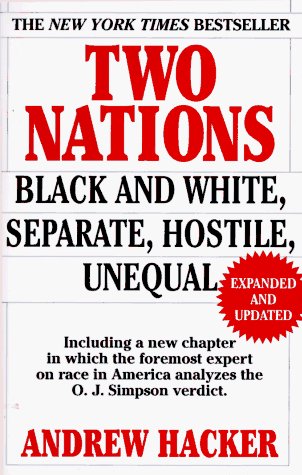If you’re white in the United States, you, says Professor Andrew Hacker, have at least that much going for you. “No matter how degraded their lives, white people are still allowed to believe that they possess the blood, the genes, the patrimony of superiority,” Hacker, a political scientist, writes of white Americans. “No matter what happens, they can never become ‘black.’ White Americans of all classes have found it comforting to preserve blacks as a sub ordinate caste: a presence, which despite all its pain and problems, still provides whites with some solace in a stressful world.”
There is much to be offended by in Two Nations. Whites, while never branded out-and-out racists by Hacker, are nevertheless insinuated to be such; as for blacks, they are made objects of Hacker’s paternalism. “Black children,” Hacker writes, “are also attuned to their bodies and physical needs. So, some educators argue, they should be allowed more leeway for moving around the classroom. ‘Michael Jackson, Michael Jordan, Bill Cosby, and Eddie Murphy would be a kindergarten teacher’s worst nightmare,’ one black professor noted. ‘She would wind up telling Michael Jackson to sit still, Michael Jordan to sit down, and Bill Cosby and Eddie Murphy to shut up.’ Similarly, it has been found that black pupils are more apt to work to full potential if their teachers identify with them in a caring and solicitous way. For this reason, they may perform best with teachers of their own race.” One wonders how a passage suggesting a controversial policy for black Americans on the basis of the achievements of an athlete and a handful of entertainers, as well as different educational methods devised for blacks only, would have been received had the late William Shockley written it.
But for Hacker, the enduring double standard permits liberals to elaborate on such thoughts throughout Two Nations. He is also understanding of the litany of separatist demands now in vogue in radical black circles and among their white attendants and apologists. In fact, Hacker offers many faddish justifications for institutions that accentuate-if they do not perpetuate-the distance between blacks and whites. Nowhere is his tendency to do so more pronounced than in his chapters dealing with crime and politics.
Whites, Hacker holds, have an irrational fear of crime being visited on them by blacks, specifically by black males. If FBI studies hold true, this statement is substantiated by figures relating to two particular crimes: murder and rape. In 1990, only 6 percent of all murders and 9.2 percent of rapes in the United States involved a black assailant and a white victim, as compared with 35.2 percent of all robberies. Why, Hacker wonders, do whites fear black criminals so much when they have only the relatively petty indignity of mugging to fear?
According to Hacker, whites do not fear black crime so much as crime as a general threat to the preservation of what he secs as a caste system. Thus, any case in which a white victim resists black crime is instantly blown into racially epic proportions, as happened with Bernard Goetz, a white New Yorker who fired on four black youths preparing to accost him for money. “In the eyes of the jury, and much of the public, he had let loose an overdue salvo in an ongoing racial war,” Hacker writes. “It was about time, they seemed to be saying, that a white victim struck back at these gangs of marauders.” His own explanation of the Goetz case is perhaps explained by the following passage: “Very many blacks who are young and poor feel they have never had a fair chance, nor is that prospect likely. In light of the insults and discrimination they have faced throughout their lives, it is not surprising that as many as do vent their resentment in violence. . . . Through crime, blacks are paying whites back, in the most ominous way they can. That they can harm themselves as much if not more compounds the tragedy.”
And what of Willie Horton, the convicted yet furloughed murderer from Massachusetts who became the albatross around the Democratic neck of liberalism in the 1988 election? “It is as if an assault by a black is an act of desecration that threatens the entire white race,” Hacker writes. “And that is why Willie Horton-the black man who raped a white woman-played so signal a role in electing a president.” As for the GOP that has profited so greatly from the issue of black crime, it “has all but explicitly stated that it is willing to have itself regarded as a white party.”
Two Nations, had it come out three or four years ago, might have been an eloquent polemic for the campus-bound left that has made so much noise in favor of multiculturalism (according to which everyone looks different while thinking the same way), diversity faculty hiring, affirmative action in admissions policies, and student speech codes. Indeed, the meatiest chapters in Two Nations have to do with education. But after the Los Angeles riots, the book seems misguided, to say the least. Can Andrew Hacker be serious when he justifies the criminal opportunism of looters by citing the S&L scandal?
As for law-abiding black people who may or may not have taken advantage of government reforms over the past thirty years to improve their lives, to enter into and secure themselves in the middle class, to lead productive, exemplary lives, Professor Hacker has little use for them. “Republican administrations make sure that they appoint a few black officials, either vocal conservatives or taciturn moderates willing to remain in the background. (And they were especially adroit in finding apt candidates for the Supreme Court and the Joint Chiefs of Staff.)”
[Two Nations: Black and White, Separate, Hostile, Unequal, by Andrew Hacker (New York: Charles Scribner’s Sons) 257 pp., $24.95]



Leave a Reply